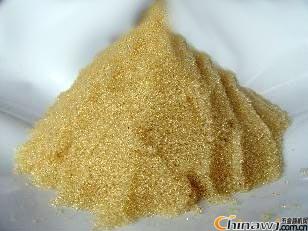In the ion exchange water treatment, the ion exchange resin should be rationally selected according to the water quality of the raw water, the requirements for the quality of the effluent water, the basic properties of the ion exchange resin, and the performance of the ion exchange equipment.
In the ion exchange water treatment, the ion exchange resin should be rationally selected according to the water quality of the raw water, the requirements for the quality of the effluent water, the basic properties of the ion exchange resin, and the performance of the ion exchange equipment. It can be considered in the following aspects:
First, the exchange capacity
The greater the exchange capacity of the resin, the greater the amount of water treated. In the ion exchange resin composed of the same type of skeleton, the exchange capacity of the weak resin is greater than that of the strong resin, but the mechanical strength of the weak resin is generally poor, resulting in premature loss of the resin. Therefore, for the ion exchange resin for water treatment, it is necessary to consider a sufficient mechanical strength of the resin while selecting a high exchange capacity as much as possible.
Second, the quality of raw water
For removing only the cations that are strongly adsorbed by the exchange of water (
If it is necessary to remove the less adsorbent cations (such as K+, Na+) and anions in the raw water (
Therefore, for high-hardness or high-salt raw water treatment, before using strong acid (or strong alkaline) resin treatment, it should pass weakly acidic or strong alkaline resin, so the choice of resin is economical in water treatment practice. reasonable.
If the raw water contains more organic matter, a macroporous resin with good oxidation resistance and high strength should be used.
Third, the water quality of the effluent
In the demineralized water treatment, a strong acid cation resin may be used or used in combination with a weakly acidic cation resin.
In the demineralization treatment, it is necessary to use a strong resin to remove ions with weak exchange capacity, or to use it in combination with a weak resin, which is important in the desalination treatment system.
Fourth, the type of equipment
For moving bed and fluidized bed, it is required to use a resin with high abrasion resistance and high strength. For the two resins in the mixed bed, a resin having a large difference in wet and true density should be used.
Xinpei Environmental Research and Development has various water treatment chemicals that can effectively solve industrial water problems, such as scaling, corrosion, etc., such as circulating cooling water, boiler water, and coating water. It also provides high-quality filter materials such as resin, activated carbon and quartz sand. And equipment cleaning and maintenance services, if there are related problems or needs, please call to discuss.
Http://news.chinawj.com.cn
 Editor: (Hardware Business Network Information Center) http://news.chinawj.com.cn
Editor: (Hardware Business Network Information Center) http://news.chinawj.com.cn 
Ningbo Actmix produce and supply the excellent retarder for natural and synthetic rubber, suitable for EPDM, NBR & HNBR, obviously delay the scorching time, but not affect the curing speed. Actmix®Retarder E-80 & Actmix®CTP-80, Actmix®CTP-50 can application for the automotive rubber sealing system, rubber tyres etc rubber products.
Actmix®Retarder E-80 is an excellent environmental retarder for natural and synthetic rubber, suitable for EPDM, NBR and HNBR,it obviously delay the scorch time, but not affect the curing speed. Especially for thiuram vulcanization system, and can be used as the second promoting agents to reduce curing time and improve production efficiency.
Rubber Scorching Retarder,Pre-dispersed Rubber Retarder,Rubber Predispered Scorch Retarder,PDM Rubber Scorch Retarder
Ningbo Actmix Rubber Chemicals Co., Ltd. , http://www.actmixchemicals.com